2017-2018广州市第一中学九年级期中考试英语试题【word版】
由于版式的问题,试题可能会出现乱码的现象,为了方便您的阅读请点击全屏查看
一、语法选择(共15小题;每小题1分,满分15分)
阅读下面短文,按照句子结构的语法性和上下文连贯的要求,从1~15各题所给的A、B、C和D项中选出最佳选项。

Your family will take a trip to the Lychee Bay tomorrow and everyone is happy. However, will it rain tomorrow? Your father turns 1 the radio and the family spends minutes together 2 to the weather report.
“It will be partly cloudy tomorrow morning, 3 it will become clear by early afternoon. The temperature will go up 4 in the afternoon and will get as high as 31℃.”
Because there 5 no rain, everyone in your family feels much 6 . Without the weather forecast, you would know 7 about this, and you would just have to take your chances. But now, you can 8 your trip without worrying whether it will rain or not.
9 man you may thank for this is Cleveland Abbe. He 10 as the father of the weather bureau. He was the first person 11 daily weather forecasts in the United States.
Abbe started 12 daily weather reports in 1869. He drew the weather maps from telegraphed reports of weather conditions. Then he showed them 13 the public. Because their forecasts were always correct, the reports were popular.
The government found Abbe’s weather reports 14 important that they made Abbe a meteorologist, and he 15 giving forecasts three times a day. He was the first official forecaster of the U.S. Weather Service.
1. A. off B. on C. down D. into
2. A. listen B. to listen C. listening D. to listening
3. A. or B. and C. if D. but
4. A. quick B. quickly C. quicker D. more quickly
5. A. will be B. is C. will have D. has
6. A. happy B. happier C. the happiest D. happiness
7. A. something B. everything C. nothing D. anything
8. A. plan B. planned C. to plan D. planning
9. A. A B. An C. The D. /
10. A. considered B. was considering C. has considered D. is considered
11. A. publish B. to publishing C. to publish D. published
12. A. he B. him C. his D. himself
13. A. to B. for C. out D. up
14. A. too B. very C. such D. so
15. A. begins B. began C. had begun D. is beginning
二、完形填空(共10小题;每小题1.5分,满分15分)
阅读下面短文,掌握其大意,然后从16~25各题所给的A、B、C和D项中,选出最佳选项。
Andrew Cooper got a new job at Tsing Yi Primary School. In order to get to know his new students, he thought of a good idea. Most of his students came from __16____ families. He asked them to complete the 17 “I wish my teacher knew…” and share something about themselves.
Their 18 answers gave the teacher a chance to understand his students’ difficulties. “I wish my teacher knew I have no pencils to do my homework,” wrote one child. “I wish my teacher knew sometimes my homework is not signed, because my mum is 19 a lot,” wrote another. Some shared hope for the 20 . “I wish my teacher knew that I want to go to college.”
“Some notes are really heartbreaking,” Cooper tells TVB News. “I care ___21___ about each of my students and I don’t want them to be poor forever.” He explains, “I hoped to know how I could better support them. So I 22 to let them tell me what I needed to know. That was why I created the fill-in-the-blank exercise.”
Talking about one of the students wrote that she had no friends in class, Cooper continues, “I felt encouraged to see how much support the other kids offered her. They invited her to 23 them at break and sit with them at lunch. You see, children have an unusual ability to express 24 .”
“The results have been 25 ,” says Cooper. “It speaks to the importance of giving people a voice and really listening to them.”
16. A. broken B. happy C. poor D. small
17. A. letter B. passage C. note D. diary
18. A. right B. smart C. usual D. honest
19. A. busy B. annoyed C. angry D. famous
20. A. career B. future C. research D. course
21. A. freely B. deeply C. secretly D. directly
22. A. learned B. refused C. turned D. decided
23. A. talk about B. play with C. depend on D. look for
24. A. happiness B. loneliness C. kindness D. safeness
25. A. surprising B. relaxing C. worrying D. boring
三、阅读(共两节,满分45分)
第一节 阅读理解(共20小题;每小题2分,满分40分)
阅读下列短文,从每题所给的A、B、C和D项中,选出最佳选项,并在答题卡上将该项涂黑。
(A)
Once a very rich man and his son collected valuable paintings by famous artists like Picasso, Van Gogh and Monet.
Later, the son left to join the army. After a few weeks, the old man received a letter saying his son had died while taking another soldier to a hospital. The old man became very lonely and sad.
One day, a soldier visited the old man and gave him a gift—it was a painting of his son. It became the old man’s most valuable item. Whenever he looked at the painting, he thought of the happy memories with his son. He told his neighbours it was the greatest gift he had ever received. The following spring, the old man passed away.
All of the old man’s paintings would be sold at an auction(拍卖会). The auction began with the painting of the old man’s son.
“Who will open the price at $100?” the auctioneer asked. Moments passed and no one spoke or raised their hands. Someone said, “Who cares about that painting? Let’s get on to the good ones.” More voices followed in agreement. “No, we must sell this one first,” replied the auctioneer. “Now, who will take the portrait of the son?”
Finally, a good friend of the old man spoke, “Ten dollars!” “Will anyone go higher?” called the auctioneer. After more silence he said: “Going once… going twice…Sold!” The auctioneer then announced that the whole auction was over. “According to the father’s will, whoever takes the son’s painting gets the whole collection.” The auctioneer said.
Because of the father’s love, whoever took the son got it all.
26. From the first paragraph, we can learn that __________.
A. Monet was famous for his paintings. B. The rich man was good at painting.
C. Van Gough was the rich man’s friend. D. The son was a famous artist.
27. What made the rich man lonely and sad?
A. His son’s leaving for the army. B. His son’s stay in hospital.
C. The death of his son. D. The letter from his son.
28. Why did the rich man think the painting of his son the greatest gift?
A. Because it was valuable and worth a lot of money.
B. Because it was painted by the famous artist Picasso.
C. Because it showed his son’s happiest memories in the army.
D. Because it reminded him about the good days with his son.
29. What can we infer(推断) from the auction?
A. The auction was over after the first painting was sold.
B. Nobody was interested in the paintings in the auction.
C. The auctioneer agreed to sell the other famous paintings first.
D. People in the auction didn’t think the first painting worth 100 dollars.
30. What would probably happen after the auction?
A. Everyone realized the importance of the painting of the son.
B. The old man’s good friend got the whole collection for only ten dollars.
C. The whole collection was given away to charity by the old man’s friend.
D. The painting of the old man’s son became as popular as the other paintings.
(B)
Christopher Columbus, known as the first European to discover the Americas, was born in 1451 in Italy. His father was a wool businessman. When he was young, Columbus loved sailing adventure very much. When he was 26 years old, he began to make business voyages(航海). The farthest countries he reached were Iceland and Guinea.
At that time, many European countries became stronger and stronger. Their ships reached Africa and Asia. They got gold, silver, silk, tea and other things from the countries of Asia. The book The Travels of Marco Polo greatly influenced him, in which China and India were written perfectly. Columbus wanted to make another way to these two countries. Since he didn’t have enough money, he asked some countries for help, for example, Portugal, Spain, the UK and France. He told the leaders the earth was round and if they helped him, he could easily get to China. Nobody believed his words and he was regarded as a cheat. Of course he didn’t succeed.
It was not until 1492 that his dream came true. The queen of Spain persuaded the King to support Columbus. On August 2, 1492, Columbus left Spain and began his voyage. He had three ships. After two months’ hard sailing, on October 12, they got to an island in the Bahamas. On October 29, they reached Cuba. But a few days later, one of his ships left them. And on December 25, his flagship sunk. Luckily, the ship that left them joined him again. They went back to Lisbon on March 4, 1493.
Although they didn’t get to rich Asian countries and took back wealth, they found a new place that nobody had gone to. Columbus thought it was India and called the islands the West Indias.
From 1493 to 1504, he sailed to America three times. He reached most of the coast of southern America and set up many colonies. On May 20, 1506, Columbus died because of disease.
31. What was Columbus’ dream according to the passage?
A. To reach Africa and Asia by ship.
B. To make another way to China and India.
C. To make enough money for his adventures.
D. To get gold, silver, silk, tea and other things.
32. Columbus’ voyage from Spain to Lisbon lasted for about __________.
A. 26 years. B. 11 years. C. 7 months. D. 2 months.
33. Which of the following is the correct route (航线) of Columbus’ first voyage?
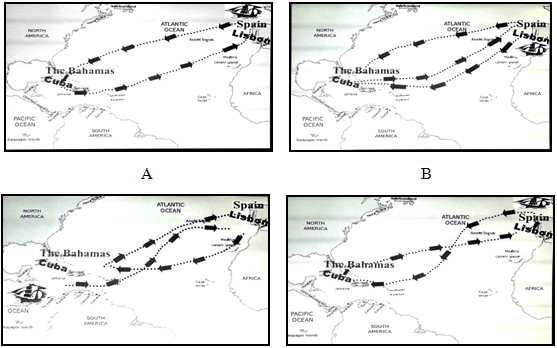
34. In what order did the following take place in Columbus’ life?
a. He sailed to America three times.
b. In 1477, he began to make business voyages.
c. He began his voyage with the help of the queen of Spain.
d. He found a new place that nobody had gone to.
e. He tried to get support from some countries.
A. b-e-c-d-a B. b-e-d-a-c C. d-e-c-b-a D. b-c-e-d-a
35. What is the best title of the passage?
A. How Columbus got the sailing support. B. How Columbus found India.
C. Columbus loved sailing adventure. D. Columbus and his voyages.
(C)
Researchers from Israel found that our given names may have something to do with our facial appearances.
Lead writer Yonat Zwebner of a university, along with her team, did eight different experiments in Israel and France. The different experiments were set up to answer two main questions: whether people can correctly guess a person’s name based only on a photo of a face and what is behind this matching effect.
During the experiments, researchers asked students to look at photos of people’s faces and guess each person’s name from a list of four choices. They correctly guessed the right name 38 percent of the time, which was better than the 25 percent of a blind guess.
What’s more, when the faces the students looked at came from within their own country, they were able to best match the faces to the names. French students were better at matching only French names and faces while Israeli students were better at matching only Hebrew names and Israeli faces.
Researchers believe it is possible that people change their appearances without paying attention to it, to match their names. One study especially backed up this idea, showing that a hairstyle, something that can be changed by people easily, was enough to guide others in correctly guessing their names.
“Earlier research has shown there are cultural meanings carried by names, including how someone should look. For example, people are more likely to imagine a person named Bob to have a rounder face than a person named Tim. We believe these meanings can, over time, influence(影响) people’s facial appearances,” Zwebner said.
The results of the experiments may even make parents think twice when choosing a name for their children.
“If a name can influence appearance, it can also influence many other things. This research opens an important direction that may suggest how parents should consider better the names for their children,” said Zwebner, who recently had a baby herself.
“As parents, it was really difficult for us to name our 12-day-old daughter as we know the meanings of names.”
36. One of the purposes of the experiments is to ___________.
A. give the students a chance to know each other
B. explain what influences our facial appearances
C. find out different personalities carried by different names
D. see if people can correctly guess a person’s name from his/ her face
37. People can match the faces to the names more easily when __________.
A. they do a blind guess
B. they look at photos of the faces
C. the faces are from their own country
D. they are given four choices
38. What does the underlined part “backed up” in Paragraph 6 probably mean?
A. Supported. B. Changed. C. Compared. D. Cancelled.
39. What are Paragraph 6 and Paragraph 7 mainly about?
A. The results of changing names.
B. Names have something to do with appearances.
C. The importance of cultural meanings carried by names.
D. The importance of a hairstyle in guessing different looks.
40. According to Zwebner, we know that ________.
A. facial appearances may influence names
B. a name may influence many things and should be well chosen
C. names can be changed by people easily to match their hairstyles
D. we should pay less attention to the meanings of names and be ourselves
(D)
How do money problems influence our social life? Do we simply stop going out and enjoying ourselves? And, if we do stop going out, are there any other ways to party?
Psychologists say that having fun with close friends and family is very important to our mental health. Last Christmas, Yorkshire Bank, UK did a survey to see how people were planning to celebrate the festive season when they had not much money to spend. They found that eight out of ten Britons preferred an invitation to a house party to a night out in a bar or club.
So, the question is, how can we throw a party without spending all our money? Easy – just read our “hot tips”:
Hot Tip #1 – Careful planning
“It’s all in the planning,” claim party experts. If you plan the number of guests and the menu with prices in mind, it won’t be expensive. Remember, in this situation, less is more – the fewer guests you invite, the lower your costs will be. Equally, if you hold the party in your own home, it’ll be even cheaper for everyone. Going to pubs or clubs will be too expensive. Also, if you buy a few candles and simple decorations, you’ll be able to create a bar scene in your own front room.
Hot Tip #2 – Shop intelligently
One of the biggest costs is the food and drink. If you shop efficiently, you will spend less money on them. In big supermarkets, you often have “three for the price of two” food offers. You can also pick up alcohol quite cheaply if you look for deals. If you host a party, people won’t require a three-course meal – a simple spread of crisps, olives and dips is enough.
Hot Tip #3 – Caring is sharing
Don’t be scared to ask your guests to bring something. If you invite close friends, they’ll be happy to contribute. For example, you could ask someone to bring some snacks and someone else to bring cups. After all, the idea is to get your nearest and dearest together in honour of friendship and good times.
So, what are you waiting for? Find an excuse to celebrate and start sending out those invitations. But remember, save yourself some money, get creative and don’t do everything yourself.
41. The survey was done to find out ________.
A. where people could shop efficiently on Christmas
B. what stopped people going out and having fun
C. how people with not much money celebrated Christmas
D. why Britons wanted to have a night out in a bar or club
42. Yorkshire Bank surveyed 1,000 people, how many of them preferred a house party?
A. 8. B. 18.
C. 80. D. 800.
43. What does the underlined “them” in Paragraph 5 refer to?
A. Candles and simple decorations.
B. Food and drink.
C. Three-course meals.
D. The biggest costs.
44. According to the hot tips, what should we do for a party with less money?
A. Invite as many friends as you can.
B. Ask a friend to bring some snacks.
C. Prepare a three-course meal.
D. Find an excuse to ask for help.
45. In which part of a newspaper can we probably find this article?
A. Advice page. B. Shopping tips.
C. Mental health. D. Medical care.
第二节 阅读填空(共5小题;每小题1分, 满分5分)
阅读短文及文后A~E 选项,选出可以填入 46~50 各题空白处的最佳选项,并在答题卡上将该项涂黑。
It was Mother’s Day yesterday. It was very late when I got home after work. 46._______________
My son Leon, a second-grade pupil at a primary school, came over to me happily and began to tell me a story. 47._______________ So I pretended to be interested but fixed my eyes on my phone. Though quite sad, he then said some good wishes to me, yet my eyes still focused on my phone. Seeing that, he chose to bring me a cup of tea. 48._______________ At last, he became quiet and left silently.
Moments later, he came back and said angrily to me, “49._______________ Mrs Hung asked all the students in our class to do something to show our thanks to our mothers—anything from singing a song or just expressing a good wish, but you love your phone more than me. You let me down.”
50._______________ According to a recent survey among kids, nearly 70% said their parents often pay too much attention to their mobile phones. Mandy Chiu, the headmaster of the school, has strongly suggested that parents spend more time on family education because they are their children’s first teachers.
A. I will never do anything for you any more. B. I was still looking at my mobile phone, without even a sign of a smile on my face. C. I felt regretful after hearing his words and promised to spend more time with him. D. His story was really boring because I had heard it many times. E. I was so tired that I wanted to do nothing but chat on my smart phone. |
四、写作(共三节, 满分35分)
第一节 单词拼写(共6小题:每小题1分,满分6分)
根据下列句子及所给单词的首字母写出所缺单词。(每空只写一词)
51. Well done! Your answers are c__________.
52. Jill likes wearing fashionable clothes. She wants to be a m__________ when she grows up.
53. Jane’s parents take good care of her. They don’t e_________ her to do any housework.
54. Drivers must drive carefully to a__________ accidents.
55. Tom really has a good s__________ of humour. His jokes make all of us happy.
56. It’s p_________ to knock at the door before entering a room.
第二节 完成句子(共7小题:每小题2分,满分14分)
根据所给的汉语内容,用英语完成下列句子。(每空只写一词)
57. 看吧,这个小女孩对这些玩具没兴趣。
Look! The little girl __________ no __________ __________ these toys.
58. 不要嘲笑处于困境的同学!
__________ __________ __________ the students in trouble!
59. 如果我不帮助她,我会为自己而感到羞愧。
I will __________ __________ __________ myself __________ I don’t help her.
60. 从黄沙坐地铁去大坦沙要多久?
__________ __________ does __________ __________ to go to Datansha from Huangsha by metro?
61. 汉斯正在考虑谁来解决这个难题。
Hans was thinking about __________ __________ __________ this difficult problem.
62. 根据当地法律,那个小偷应该被关进监狱。
According to the local law, the thief __________ __________ __________ to prison.
63. 从着火的大楼中救出这么多人,他们是多么勇敢的消防员啊!
__________ __________ firefighters they are! They saved many people from the burning building.
第三节 书面表达(共1小题,满分15分)
假如你是李华,你的外国笔友Lisa转学了。她在新环境中感到孤独,写了一封邮件向你求助。请你根据以下要点,用英语给她回一封邮件,对她的处境表示理解,给出相关建议,并鼓励她享受在新学校的学习生活。
你的建议:
1. 友好地对待他人;
2. 为班级做好事;
3. ……(请你补充1个建议)
要求: 1. 文章必须包含全部要点内容,并作合理拓展;
2. 文中不得出现真实的人名、校名等相关信息;
3. 词数:120词左右。(开头和结尾已给出,不计入词数)
Dear Lisa,
I’m glad that you share your problem and feeling with me in your last letter.
_____________________________________________________________________
_____________________________________________________________________
_____________________________________________________________________
_____________________________________________________________________
_____________________________________________________________________
_____________________________________________________________________
_____________________________________________________________________
_____________________________________________________________________
_____________________________________________________________________
_____________________________________________________________________
Wait for your good news.
Yours,
Li Hua
广州市第一中学2017-2018学年第一学期期中检测
九年级英语参考答案
一、语法选择(共15小题;每小题1分,满分15分)
1-5 BCDBA 6-10 BCACD 11-15 CCADB
二、完形填空 (共10 小题,每小题1.5分;满分15 分)
16-20 CCDAB 21-25 BDBCA
三、阅读
第一节 阅读理解(共20小题,每小题2分;满分40分)
26-30 ACDDB 31-35 BCAAD 36-40 DCACB 41-45 CDBBA
第二节 阅读填空(共5小题,每小题1分;满分5分)
46-50 EDBAC
四、写作(共三节,满分35分)
第一节 单词拼写(共6小题,每小题1分,满分6分)
51. correct 52. model 53. expect 54. avoid 55. sense 56. polite
第二节 完成句子(共7小题;每题2分,满分14分)
57. has; interest in (1’+0.5’+0.5’;第一空写成have给0.5’,其它情况给0分。)
58. Don't/ Never laugh at (1’+0.5’+0.5’;第一空写成don’t/ never给0.5’,其它情况给0分。)
59. feel ashamed of; if (0.5’×4)
60. How long; it take (0.5’×4)
61. who to solve (1’+0.5’+0.5’;第一空写成Who给0.5’,其它情况给0分。)
62. should be sent (0.5’+0.5’ +1’;第三空写成send给0.5’,其它情况给0分。)
63. What brave (1’×2;第一空写成what给0.5’,其它情况给0分。)
第三节书面表达(共1题,满分15分)Possible version
Dear Lisa,
I’m glad that you share your problem and feeling with me in your last letter.
It’s common for a student to feel lonely at a new school. Everything seems different. However, anyone in your situation may feel the same. You are not alone.
I believe everyone will like you soon because you’re a very good girl. First, try to smile to others and be friendly to them. Sometimes a warm smile can win friendship. Then, it’s a good choice to do something good for your class. This can help you to get close to others and you’ll make friends easily. Last but not least, why not take part in some school events, such as school clubs and sports meetings? You will meet some students with the same hobbies and find a place to fit in.
I hope my advice will be helpful to you and you’ll find your way to enjoy your school life there.
Wait for your good news.
Yours,
Li Hua

孔乙己是贫困潦倒的知识分子。在书中,孔乙己是一个知识分子,满口“之乎者也”,但是他很穷,还窃书,说过“读书人的事,怎么能叫窃,”被人嘲笑,他...
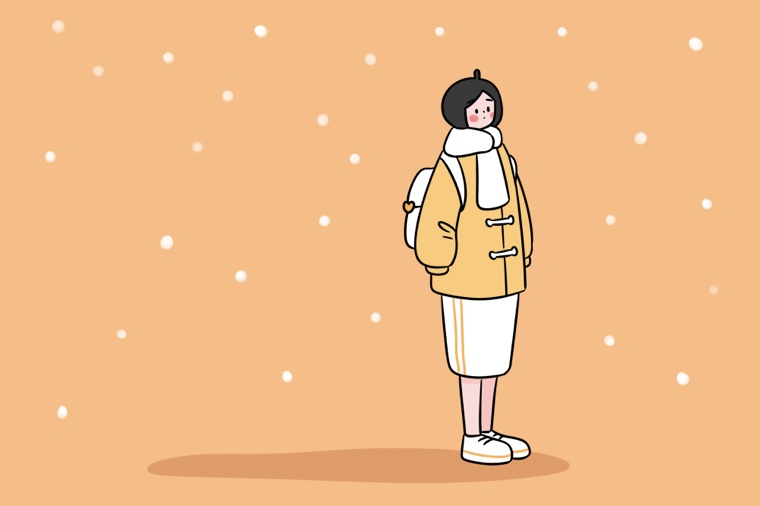
自然界产生氧气的化学方程式:光合作用的反应式为6CO2+12H2O→C6H12O6+6O2+6H2O。包括光反应和暗反应两个过程。需要具备光...
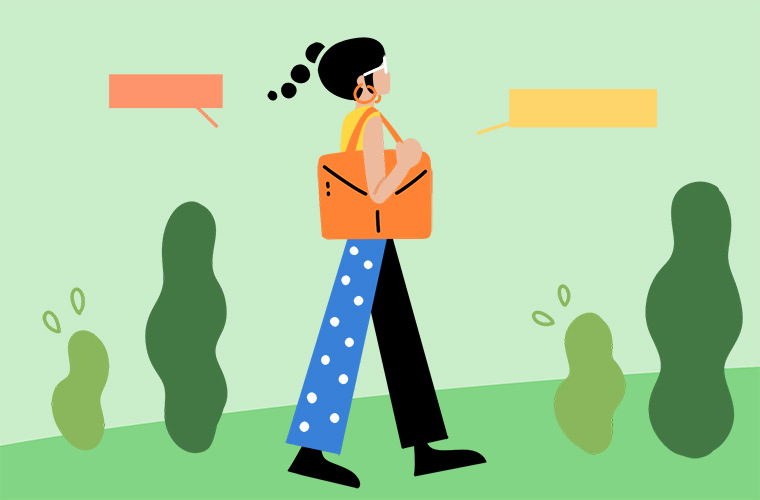
有的高校没有条件,只要学业水平成绩都合格就可以,比如中国科学院大学。有的需要平常学习考试成绩,比如北京外国语大学要求高三第一学期期末成绩在全...

在四则运算中,表示计算顺序,在小括号之后、大括号之前;表示两个整数的最小公倍数;表示取未知数的整数部分;在函数中,表示函数的闭区间;在线性代...
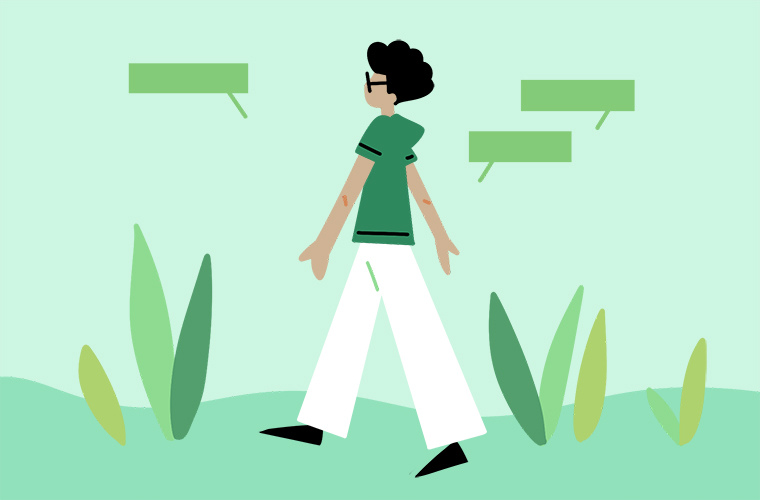
济南开设的最好的职高学校有:济南方信集团职业高中、济南公共交通职业高中。济南市公共交通职业高级中学是由济南市公共交通总公司承办,业务属济南市...

实然:是说事物实际上就是这样的,但不同于现实性(现实性指其有合理性和客观性);应然:就是应该是怎么样的意思,比如说这件事,就应该是那样的结果...

地中海气候一种夏季炎热干燥、冬季温和多雨,雨热不同期的气候类型。地中海气候冬季受西风带控制,锋面气旋频繁活动,气候温和,最冷月的气温在4-1...
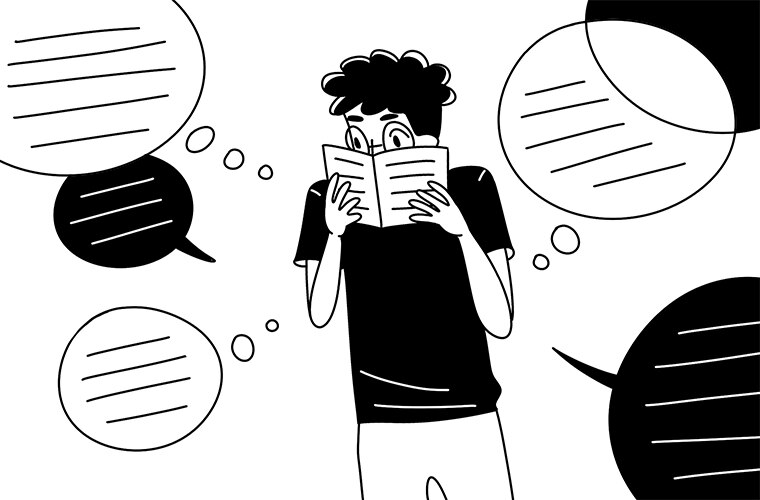
碱石灰,又称钠石灰,碱石灰是白色或米黄色粉末,疏松多孔,是氧化钙(CaO,大约75%),水(H₂O,大约20%),氢氧化钠(NaOH,大约3...